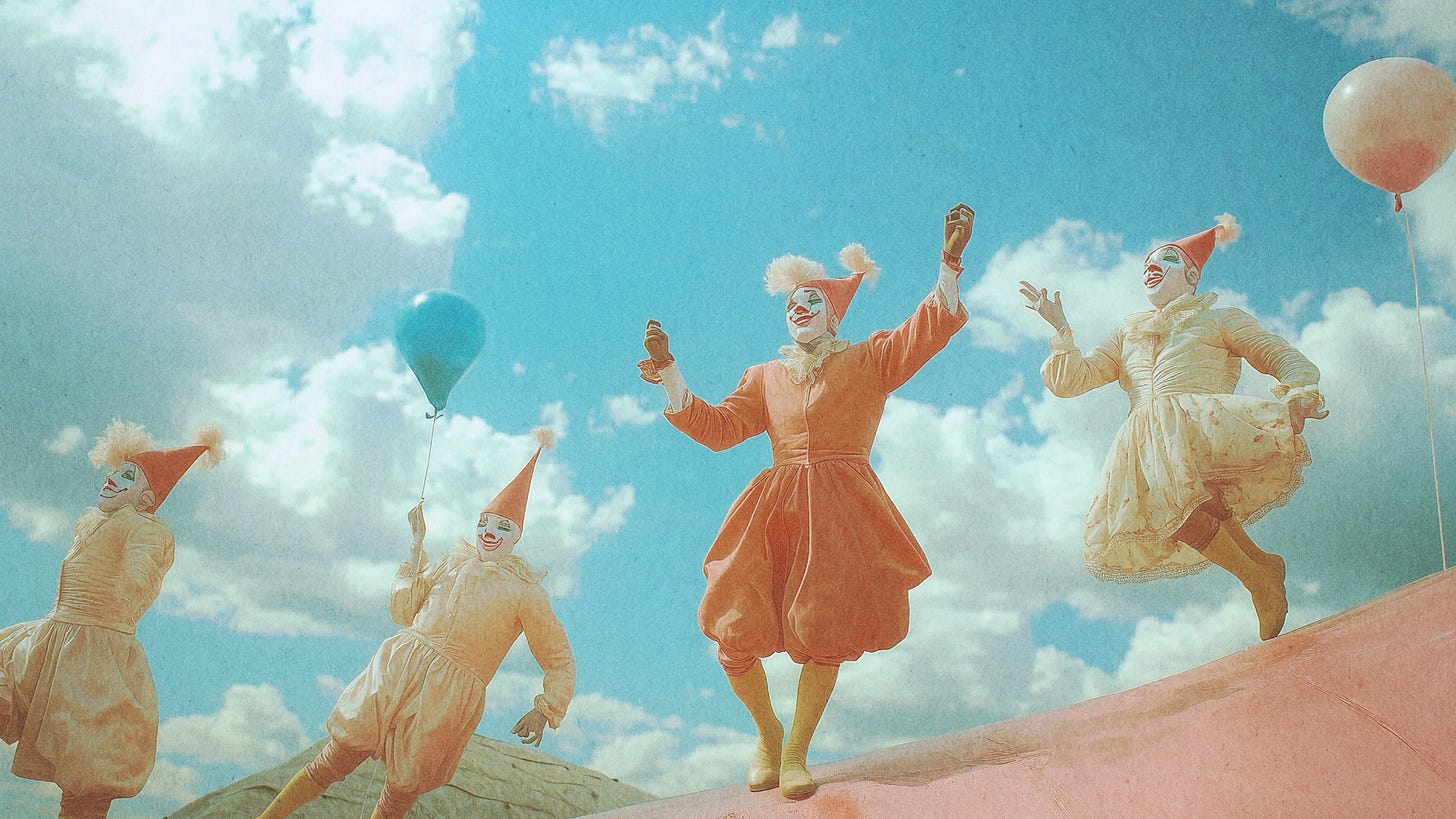Marketing, You Loser, I Still Love You
Sober but kind words for a profession under assault

by Tim Leberecht
“Well, you losers.”
That was the short, acidic comment in response to yet another marketer’s LinkedIn post lamenting the automation of the field by AI. The commentator called out the self-pity and complacency of a profession that began as romance (the glory days of the then-masters-of-the-universe Mad Men, before Wall Street ate their ads) and is now being relegated to, at best, feeding and maintaining data-hungry machines, or at worst, complete irrelevance or extinction.
The writing is on the wall: In a recent interview, Mark Zuckerberg envisioned a future where businesses come directly to platforms like Meta’s to receive a full end-to-end marketing palette—not just targeting and measurement, but also creative. With the help of AI, he predicted, Meta would be able to generate an infinite number of ads based on synthesized data and then test, deploy, and optimize them in a never-ending feedback loop.
His vision makes clear that it will not only be so-called “performance marketing” (data-driven, quantifiable demand generation) but also the imaginative, “squooshy” brand side of marketing that will increasingly be automated.
No wonder Sam Altman, OpenAI’s CEO, asserted last year that AI will eventually replace 95% of tasks currently performed by marketing agencies, strategists, and creative professionals. The 5 percent who will be spared, I suppose, will host marketing industry podcasts with former marketing executives who are hosting podcasts with former marketing executives.

Marketing has always needed marketing
Marketers are seeing it coming: In a 2025 survey, 60% expressed fear that AI could jeopardize their jobs, a notable increase from 35.6% in 2023. Additionally, 46% believe AI will eliminate more marketing jobs than it creates. Moreover, AI-based search tools are altering how consumers access information, reducing direct website traffic, and challenging traditional Search Engine Optimization (SEO) strategies.
Historically, marketing has always been on the defensive. It has become a piece of corporate folklore that the average tenure of a CMO (Chief Marketing Officer) is lower than that of any other C-suite executive—a hot seat indeed. An industry insider like Seth Matlins, managing director of the Forbes CMO Network and former CMO of Live Nation, therefore deliberately addresses the CEO and other non-marketing C-suite executives through his podcast, “The CEO’s Guide to Marketing,” in which he highlights the commercial and strategic value an effective CMO can bring.
Which remains disputed, to say the least.
Only 52% of senior marketing leaders report being able to prove marketing’s value to the business, according to a Gartner survey conducted in 2024. Another survey found that only 45% of CMOs exceed the expectations of their C-suite peers, even when marketing meets its commercial goals. Just 34% of CEOs and CFOs align with their CMOs on marketing’s role in driving growth. Additionally, only 22% of senior leaders report clear accountability from their CMO, and just over half (54%) express confidence in marketing’s ability to demonstrate its value. A Business Wire survey revealed that 61% of marketing leaders do not use Return-on-Investment (ROI) considerations to guide their decisions because they lack confidence in their own data. Furthermore, 84% of marketers are under pressure to prove ROI to justify their budget.
The “woke washing” backlash
On top of all that, marketers didn’t help their reputation with the “woke rebrand.” In a scathing piece in The Guardian, Eugene Healey articulates what many had thought anyway: the often half-hearted rush to espouse, as prominently as possible, progressive social norms through purpose, DEI, or ESG initiatives only to then rescind them swiftly in the headwinds of a shifting political climate was first hubris, then cowardice, and ultimately played right into the hands of right-wing movements. “In a bizarre inversion of reality, it’s somehow become punk to champion the same power structures that have dominated society for centuries,” Healey writes.
Marketers bear some of that responsibility. “It’s here we started to lose the plot. Brands no longer sought to be loved—they demanded to be supported, treated as movements rather than commercial entities,” he argues. And: “Through the rear window it’s easy to see that the backlash was inevitable: if progressive values could so easily be commodified as a tool for selling mayonnaise, why shouldn’t those values be treated with the same fickleness as condiment preferences?”
The irony is tragic: by wanting to do more than sell, marketers sold out.
If AI now replaces most marketing professionals and does their “dirty, dull, and dangerous work” (Andrew McAfee’s famous term for anything automatable) with greater speed and less ego, no one will moan but the marketers themselves. Since its post-industrial inception, marketing has often been viewed with skepticism if not contempt, as a field full of ego-laden manipulators who would sell their grandmother at a discount if it earned them an industry award or one of those insignia of power to whose desirability they devoted their life’s work.
There is, for many, a sense of Schadenfreude: If marketing was instrumental in colonizing and consumerizing our lives, then it is only fitting that it is now consumed by the ultimate colonizer—AI.

Marketing might smell bad, but it’s not dead yet
What’s bizarre though is that even as AI is underway to dramatically transform, if not upend, the marketing industry as we know it, the big AI firms still can’t figure out how to market AI, as they are facing widespread fear, overwhelm, or even apprehension among consumers. Doom or boon, servant or overlord, generalist or specialist, search engine or generator, assistant or boss, truth finder, seeker, or creator? It’s difficult to pin AI down to one clear set of characteristics. Because it possesses so many, AI remains the “man without qualities.”
So the AI platforms are calling trustworthy vintage brands to the rescue, like Jony Ive, Apple’s design mastermind who recently formed, via a $6.5 billion acquihire, the dream team of the AI-first era with OpenAI’s Sam Altman as the new Steve Jobs. The power couple aims to develop the definitive AI hardware device for consumers, giving “the man without qualities” a strong personality and concrete form (rumors say it may resemble Apple’s iPod), in short, “the coolest piece of technology that the world will have ever seen,” as Altman put it with typical Silicon Valley understatement.
OpenAI’s brand, not unanimously beloved, shall we say, will get a boost from Ive’s halo. The alliance is a strange mix of both design nostalgia—a longing for the simplicity and clarity of the Apple heydays—and accelerationist move: the creation of an AI device that may succeed where others, like the much-maligned Humane AI Pin (that Altman had also invested in), have failed. Apple, the world’s most valuable brand, already struggling with Trump’s tariffs, is vulnerable in this new America-first, AI-first era. OpenAI, together with former Apple design czar Ive, might eat its lunch.
Meanwhile, dream teams around personal brands are flourishing. Kara Swisher and Scott Galloway, hosts of the Pivot podcast, recently inked a deal with Vox Media potentially worth $70 million. The direct-to-audience creator economy—and especially the manosphere—is thriving, with voices like Joe Rogan commanding massive audiences. Many credit podcasts with being the secret winner of the U.S. elections (and I have a feeling podcasts are the secret throughline of this article) as they provide fertile grounds for those human qualities that always cut through: highly opinionated, controversial personalities with strong, if not extreme views, and a knack for speaking their mind and breaking norms, taboos, and boundaries.
Making meaning out of nothing is not nothing
All of this shows: marketing might smell bad, but it’s not dead yet. And I’m happy about that because I have a soft spot for marketers, probably because marketing was my professional coming-of-age: I’ve been a CMO myself, first for design and innovation consultancy Frog Design, then its parent company, Aricent, a software services firm, and finally NBBJ, a global architecture and design firm. I considered it a dream job.
Marketing was my first love—and it was my last, before I left the corporate world and co-founded the House of Beautiful Business in 2017. When I wrote my first book, The Business Romantic, in 2015, I drew heavily from my experience as CMO, and in many ways it was a book by a marketer for marketers: for the creators, storytellers, community builders, curators, and experience designers whose work it is to imbue the mundane with meaning, and expose us to the unseen, unknown, unexperienced, to the novel and original—to the other.
Sometimes this noble pursuit can lead to exaggeration, and in some cases even phoniness, but the romantic in me wants to believe that regardless of sporadic excesses, any marketer, at heart, is driven by this shared mission. Yes, some put lipstick on a pig—but even that pig means more than one without.
Marketers have always existed—as bards, jesters, dramaturgs, and masters of ceremony. Some say not just brands, but markets are fictions. One could argue capitalism itself is merely our times’ arena for fulfilling a timeless human impulse: to tell stories.
In that sense, the backlash to “woke washing” might be a blessing for brands that are now operating in what Matt Klein and Edmond Lau dubbed “Dark Mode.” As Eugene Healey writes, brands “are back to their true role: creating fiction and spectacle to grease the wheels of consumption. Done right, I believe that fiction can still produce moments of extraordinary clarity and beauty.”
Brand strategist Zoe Scaman, however, calls this a “false binary” and warns of “overcorrection.” The conclusion, in her opinion, cannot be to leave activism to the activists. She refers to the massive cultural power of brands that is evident in the sheer financial power they yield. Collectively, they spend over $1.07 trillion on advertising this year, more than the GDP of 175 countries. “That’s cultural influence at a scale that most activists can only dream about,” she writes. “The revolution won’t go better with Pepsi, that’s for sure. But abandoning the playing field entirely only ensures that the voices most resistant to progress will be the loudest ones left in the room.”
Describing a shift from woke washing to “influence architecture,” Scaman is right in insisting on the persuasive superpower of marketing, now amplified through algorithmic manipulation. If they want, this army of persuaders can certainly do more than “just sell shit.” The question though is: Do they want to? And, as AI is taking over, even if they did, will they still be able to do what they want? And will they still be able to want it or will they be brainwashed into accepting the “Optimize the Synthetic Everything” regime?
Maybe that’s where the ultimate activism, the ultimate resistance of the human marketer begins—and ends.

The new romance: systems feeling
It’s hard to contemplate the future of marketing without feeling nostalgic. The art of crafting stories and sending subliminal messages, the social psychology marketers applied to hit consumers where it hurt, the power to produce meaning beyond mere utility—all that made marketers fascinating figures and the brands they created and we grew up with our BFF’s.
Remember the scene from Mad Men when advertising executive Don Draper pitches Kodak’s slide projector:
“Nostalgia. It’s delicate, but potent.(…) in Greek nostalgia literally means ‘the pain from an old wound.’ It’s a twinge in your heart, far more powerful than memory alone.This device isn’t a space ship. It’s a time machine. It goes backwards, forwards. Takes us to a place where we ache to go again.It’s not called ‘The Wheel.’ It’s called ‘The Carousel.’It lets us travel the way a child travels. Around and around and back home again to a place where we know we are loved.”
When he ends his presentation, both his colleagues and clients are in tears.
That ability to make us feel something, to make sense of our times by pinpointing or even shaping the zeitgeist, the power to change values and social norms—that has always drawn me to the field. After giving up a career in music, marketing was the only business function where I felt I could thrive. It was entertaining, imaginative, whimsical.
I’ve also admired marketer’s desire to understand ever-so-fickle audiences and their enigmatic behavior. Why do people act the way they do? When do they buy into something? When do they stay loyal and when do they leave? What makes them feel something? What makes them never forget what they felt?
Marketing may be trivial, but those big, timeless questions are not.
In the future, perhaps, it will no longer be the individual asking those questions, it will be the system. It won’t be about the individual’s needs, desires, or feelings, it will be about the system’s, as reality, evolving into a function of AI, will become a network of networks made of stories.
And maybe that marks the transformation of the field into an enabler of multiple narrative universes, a polyphony of synthetic meaning that no longer needs scarcity, consistency, branding, recall, advertisements, campaigns, or curation—in other words: marketing—because it is always there.
***
This essay first appeared as a Beauty Shot.